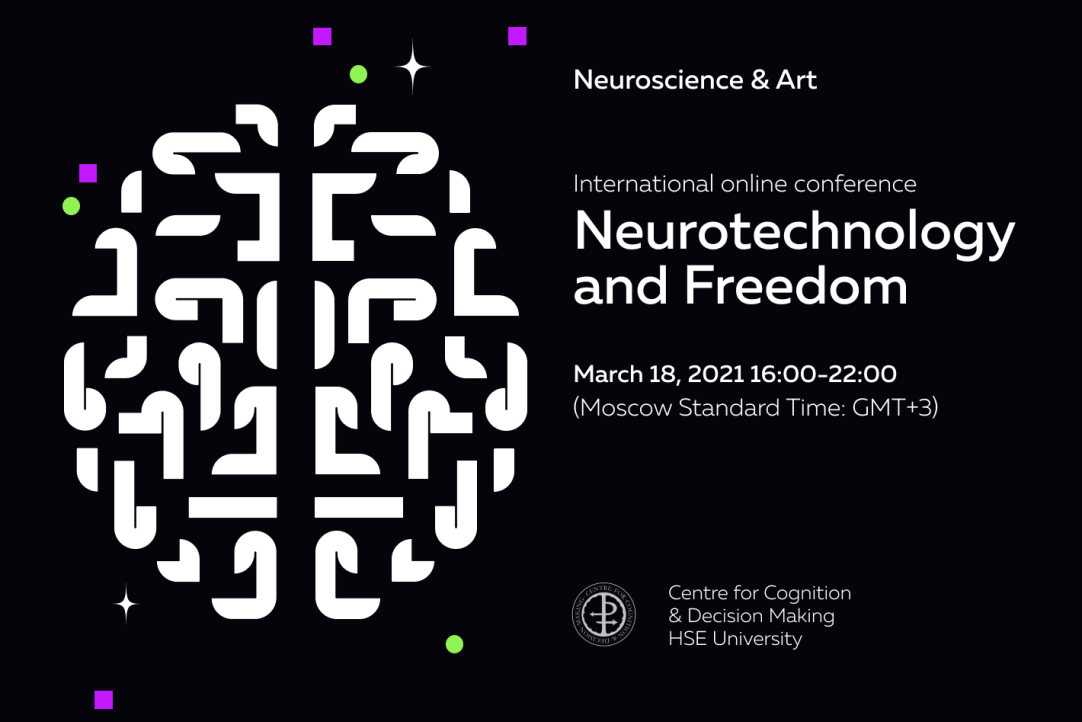Neuroscience & Art project: International Online Conference "Neurotechnology and Freedom"
Organized by the Centre for Cognition & Decision Making, HSE University supported by I-Brain Erasmus+ project
Topic: "Neurotechnology and Freedom"

Neuroscience & Art projeсt: international online conference “Neurotechnology and Freedom” to be held on March 18, 16.00 - 22.00 (GMT+3, Moscow Time).
New neurotechnologies allow not only to improve and repair brain function, but effectively manipulate human behavior. The main subject of the interdisciplinary discussion is the impact of neurotechnology on human rights and freedoms. What are the social, cultural and economical consequences of the quickly growing neurotech? Can the uncontrolled collection of brain data (e.g. using brain-computer interfaces) violate our freedom? Scientists, philosophers, researchers of art and artists will take part in the discussion about the impact of neurotech on the freedom of human beings.
We invite you to join the discussion!
Professor Patrick Haggard, a neuroscientist at University College London suggests that people have the strong belief that we make choices about what we do and that our conscious decisions initiate our actions, at least on some occasions. At the same time, our actions are clearly the result of a causal chain of neuronal activity in premotor and motor areas of the brain. Patrick Haggard declared, “We certainly don’t have free will. Not in the sense we think.”
Рrogram of the conference:
16:00 – 16:20 - Welcome words; Prof. Vasily Klucharev, HSE University, Russia;
16:20 – 16:30 - Video presentation ( Dr. Ellen Pearlman, Dr. Pentelis Lioumis, Dr. Andrey Demchinsky, Dr. Victor Hugo Souza, Dr. Vadim Nikulin, Dr. Maria Nazarova, and others will express their opinions on neuroscience and freedom)
16:30 - 16:35 - Break
16:35 - 18:50 - Talks:
16:35 - 17:00 - Dr. Suzanne Dikker, NYU Max Planck Center for Language, Music, and Emotion, USA. Projects at the interface of art, science and education on bringing neuroscience research out of the lab, into real-world environments.
17:00 - 17:25 Prof. Danil Razeev, Saint Petersburg University, Russia, expert of the Russian Science Foundation. Can neuroscience measure free will?
17:25 - 17:50 Dr. Ksenia Fedorova, Leiden University, the Netherlands. Neurointerfaces and Choice-Making in Artistic Practice.
17:50 - 18:15 Prof. Dr. Gabriel Curio, Charité – Universitätsmedizin Berlin, Germany. The Art of Brain-Computer Interfacing — Science ‘n’ Fiction
18:15 - 18:40 Prof. Risto Ilmoniemi, Aalto University, Finland. Mind states, Brain stimulation, Creativity and Art.
18:40 - 18:50 “Brain. Evolution” by Julia Kiseleva: film episode. Starring Danil Razeev, Vasily Klucharev, and Vadim Nikulin.
18:50 - 19:00 Break
19:00 — 20:30 Round table:
Prof. Gabriel Curio, Charité – Universitätsmedizin Berlin, Germany
Prof. Risto Ilmoniemi, Aalto University, Finland;
Dr. Vadim Nikulin, Max Planck Institute for Human Cognitive and Brain Sciences, Germany and HSE University, Russia;
Prof. Mikhail Lebedev, HSE University, Russia and Skoltech, Russia;
Prof. Danil Raseev, Saint Petersburg University, Russia;
Dr. Pia Tikka, Tallinn University, Estonia, University of Lapland, Finland, Hong Kong Baptist University, Hong Kong
Dr. Maria Nazarova, HSE University, and Centre for Brain Research and Neurotechnologies, FMBA, Russia.
Dr. Ippolit Markelov, ITMO University, «18 Apples», Russia
Dr. Suzanne Dikker, NYU Max Planck Center for Language, Music, and Emotion, USA.
20:30-21:00 - Talks:
20:30 - 21:00 - Prof. Patrick Haggard, University College London, UK: Searching for 'free will' in the human brain;
21:00 - 21:10 - Break
21:10 — 22:00 Presentation of art projects: Ippolit Markelov, artist, researcher, PhD in Biology, ITMO, «18 Apples», Russia;.
Moderators:
Prof. Vasily Klucharev, HSE University, Russia;
Dr. Ksenia Fedorova Leiden University, Netherlands
If you interested to take part, please REGISTER.
The conference will be held on the Zoom platform and will be broadcast on Youtube.
The organizers will send the link to the participants by 18:00 on March 17, 2021.
